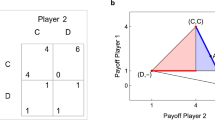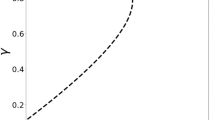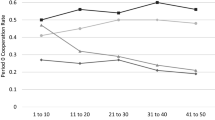Abstract
Using a symmetric two-player prisoners’ dilemma as base game, each player receives a signal for the number of rounds to be played with the same partner. One of these signals is the true number of rounds R while the other is R − 5. Thus both players know that the game has a finite end. They both know that the opponent knows this, but the finite end is not commonly known. As a consequence, both mutual defection and mutual cooperation until the second last round are subgame perfect equilibrium outcomes. We find experimental evidence that many players do in fact cooperate beyond their individual signal round.
Similar content being viewed by others
References
Anderhub V, Engelmann D, Güth W (2002) An experimental study of the repeated trust game with incomplete information. J Econ Behav Organ 48(2): 197–216
Aumann RJ (1981) Survey of repeated games. In: Aumann RJ (ed) Essays in game theory and mathematical economics. Bibliographisches Institut BI, Mannheim, pp 11–42
Axelrod R (1984) The evolution of cooperation. Basic Books, New York
Benoit J-P (1988) A non-equilibrium analysis of the finitely-repeated prisoner’s dilemma. Math Soc Sci 16(3): 281–287
Benoit J-P, Krishna V (1985) Finitely repeated games. Econometrica 53(4): 905–922
Brandts J, Yao L (2010) Ambiguous information and market entry: an experimental study. Working Paper
Brosig J, Riechmann T, Weimann J (2007) Selfish in the end? An investigation of consistency and stability of individual behavior. Munich Personal RePEc Archive 2035, University Library of Munich, Germany
Bruttel L, Kamecke U (forthcoming) Infinity in the lab. How do people play repeated games? Theory Decis
Bruttel L, Güth W, Kamecke U, Popova V (2009) Voluntary cooperation based on equilibrium retribution—an experiment testing finite-horizon folk theorems. Jena Economic Research Papers
Camerer CF, Weber M (1992) Recent developments in modeling preferences: uncertainty and ambiguity. J Risk Uncertain 5(4): 325–370
Dal Bó P (2005) Cooperation under the shadow of the future: experimental evidence from infinitely repeated games. Am Econ Rev 95(5): 1591–1604
Fehr E, Gaechter S (2000) Cooperation and punishment in public goods experiments. Am Econ Rev 90(4): 980–994
Fischbacher U (2007) z-Tree: Zurich toolbox for ready-made economic experiments. Exp Econ 10(2): 171–178
Gonzáles LG, Güth W, Levati MV (2005) When does the game end, public goods experiments with non-definite and non-commonly known time horizons. Econ Lett 88(2): 221–226
Güth W, Leininger W, Stephan G (1991) On supergames and folk theorems—a conceptual discussion. In: Selten R (ed) Game equilibrium models, vol II: methods, morals, and markets. Springer, Berlin,, pp 56–70
Güth W, Levati MV, Sutter M, van der Heijden E (2007) Leading by example with and without exclusion power in voluntary contribution experiments. J Public Econ 91(5–6): 1023–1042
Neyman A (1999) Cooperation in repeated games when the number of stages is not commonly known. Econometrica 67(1): 45–64
Normann H, Wallace B (2010) The impact of the termination rule on cooperation in a prisoner’s dilemma experiment. Working paper
Rubinstein A (1986) Finite automata play the repeated prisoner’s dilemma. J Econ Theory 39: 83–96
Selten R (1965) Spieltheoretische Behandlung eines Oligopolmodells mit Nachfrageträgheit. Zeitschrift für die gesamte Staatswissenschaft 12:301–324, 667–689
Selten R (1991) Anticipatory learning in 2-person games. In: Selten R (ed) Game equilibrium models I. Springer, Berlin, pp 98–154
Selten R, Stoecker R (1986) End behavior in sequences of finite prisoner’s dilemma supergames. J Econ Behav Organ 7(1): 47–70
Selten R, Mitzkewitz M, Uhlich GR (1997) Duopoly strategies programmed by experienced players. Econometrica 65(3): 517–555
Weg E, Felsenthal DS, Rapoport A (1990) Two-person bargaining behavior in fixed discounting factors games with infinite horizon. Games Econ Behav 2(1): 76–95
Author information
Authors and Affiliations
Corresponding author
Rights and permissions
About this article
Cite this article
Bruttel, L.V., Güth, W. & Kamecke, U. Finitely repeated prisoners’ dilemma experiments without a commonly known end. Int J Game Theory 41, 23–47 (2012). https://doi.org/10.1007/s00182-011-0272-z
Accepted:
Published:
Issue Date:
DOI: https://doi.org/10.1007/s00182-011-0272-z




